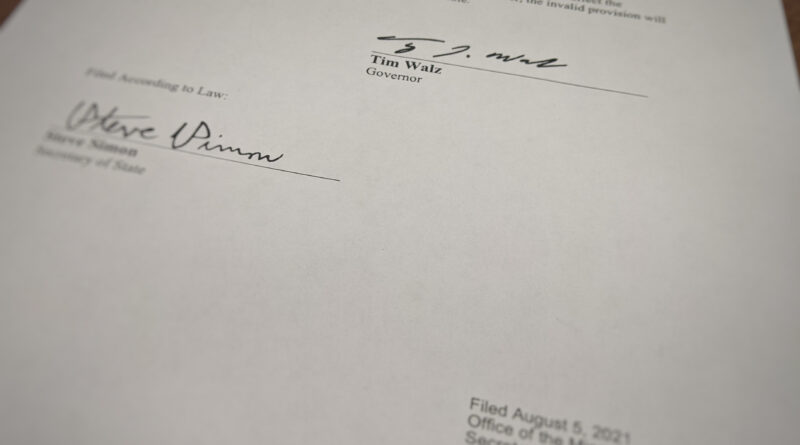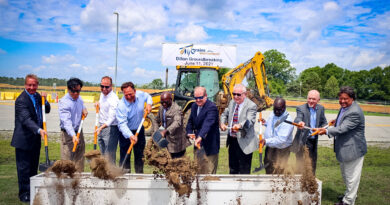Minnesota Executive Order 21-27
EO 21-27 Final Signed and Filed.pdf
STATE OF MINNESOTA
Executive Department
Governor Tim Walz
Emergency Executive Order 21-27
Providing for Emergency Relief from Regulations to Motor Carriers and Drivers Transporting Fuels in Minnesota
I, Tim Walz, Governor of the State of Minnesota, by the authority vested in me by the Constitution and applicable statutes, issue the following Executive Order:
The COVID-19 pandemic has affected the petroleum market in unprecedented ways. In April 2020, when the pandemic forced people across the country to stay home, the federal Energy Information Administration reported that the demand for gasoline was the lowest it had been in over 50 years. As economic activities slowed and the demand for gasoline fell, the price of petroleum products shifted dramatically, which resulted in significant disruptions to the petroleum markets. This in turn reduced the size of the labor pool of qualified tanker truck drivers. Producers were forced to limit production due to decreased storage space and a driver shortage.
This spring and summer, as more Minnesotans received vaccines, we started returning to regular social, recreational, and business activities. The recovery in economic activity and increased vehicle travel going into summer have contributed to increasing gasoline demand. However, refinery production of gasoline has struggled to keep up with that demand.
In addition to disruptions in product supply, the Minnesota Petroleum Marketers Association has reported that the ongoing shortage of qualified truck drivers is inhibiting efficient transport of products from refineries to fuel terminals and ultimately to local businesses and retail sites.
Fuel terminals across the state, including those at Mankato, Marshall, Sauk Center, Alexandria, St. Paul Park, Wrenshall, and East Grand Forks, have experienced shortages or outages of products, including gasoline, diesel, fuel oil, ethanol, and biodiesel. Drivers have experienced exceptionally long wait times due to increased demand at fuel terminals that do have the necessary supply.
Due to the ongoing emergency conditions in the petroleum products industry, the governors of Iowa and South Dakota have issued executive orders in their respective states, providing temporary exemptions from certain regulations to carriers providing direct assistance to emergency relief efforts by transporting petroleum products.
Minnesota Statutes 2020, section 221.0314, subdivision 9, adopts federal safety regulations, including hours of service requirements for drivers. Minnesota Statutes 2020, section 221.0269, provides: “The governor may declare an emergency and grant relief from any of the regulations incorporated in section 221.0314 to carriers and drivers operating motor vehicles in Minnesota to provide emergency relief during the emergency.”
Reliable access to products such as gasoline, diesel, fuel oil, ethanol, and biodiesel is critical to supporting our drought-stressed farming community across the state as it prepares for the upcoming harvest season, mining operations in northern Minnesota, and ongoing economic recovery efforts for tourism and local businesses such as gas stations and convenience stores. Strict enforcement of certain hours of service regulations would prevent or hinder the efficient transportation of fuels. Temporary relief is needed to allow for the continued movement of these commodities, as carriers and drivers provide necessary and time-sensitive assistance.
For these reasons, I order as follows:
- Pursuant to Minnesota Statutes 2020, section 221.0269, subdivision 1, a state of emergency exists in Minnesota that requires relief from regulations incorporated in Minnesota Statutes 2020, section 221.0314, subdivision 9, pertaining to hours of service for motor carriers and drivers of commercial motor vehicles providing direct assistance to emergency relief efforts by transporting gasoline, diesel, fuel oil, ethanol, and biodiesel.
- Motor carriers and drivers providing direct assistance to emergency relief efforts by transporting gasoline, diesel, fuel oil, ethanol, and biodiesel are exempted from paragraphs (b) and (c) under the Code of Federal Regulations, title 49, part 395.3, and which are incorporated in Minnesota Statutes 2020, section 221.0314, subdivision 9, pertaining to hours of service.
- Nothing in this Executive Order may be construed to relieve motor carriers and drivers providing direct assistance to emergency relief efforts by transporting gasoline, diesel, fuel oil, ethanol, and biodiesel from the requirements under paragraph (a) of the Code of Federal Regulations, title 49, part 395.3, and incorporated in Minnesota Statutes 2020, section 221.0314, subdivision 9, which states, in part, that a driver may drive only 11 hours during a period of 14 consecutive hours after coming on duty following 10 consecutive hours off duty.
- This Executive Order does not relieve motor carriers and drivers providing direct assistance to emergency relief efforts from regulations pertaining to driver qualifications; driving of commercial motor vehicles; commercial driver’s licenses; drug and alcohol testing for drivers; or equipment, parts, and accessories necessary for the safe operation of vehicles.
- A motor carrier operating under the terms of this Executive Order must not require or allow a fatigued or ill driver to operate a commercial motor vehicle. A driver who informs a carrier that he or she needs immediate rest must be given at least 10 consecutive hours off duty before the driver is required to return to service.
- Upon the expiration of this Executive Order, or when a driver or motor carrier has been relieved of all duty and responsibility to provide direct assistance to the emergency relief efforts, a driver that has had at least 34 consecutive hours off-duty must be permitted to start his or her on-duty status and 60/70 clock at zero.
- For purposes of this Executive Order, and as defined in Minnesota Statutes 2020, section 221.0269, subdivision 3, paragraph (c), direct assistance to an emergency relief effort terminates when a driver or commercial motor vehicle is used to transport cargo that is not part of the emergency relief effort, or when the carrier dispatches that driver or vehicle to another location to begin operations in commerce.
This Executive Order is effective immediately under Minnesota Statutes 2020, section 4.035, subdivision 2, and remains in effect for 30 days.
A determination that any provision of this Executive Order is invalid will not affect the enforceability of any other provision of this Executive Order. Rather, the invalid provision will be modified to the extent necessary so that it is enforceable.
Signed on August 5, 2021.
Tim Walz
Governor
Filed According to Law:
Steve Simon
Secretary of StateLast updated: Friday, August 6, 2021




